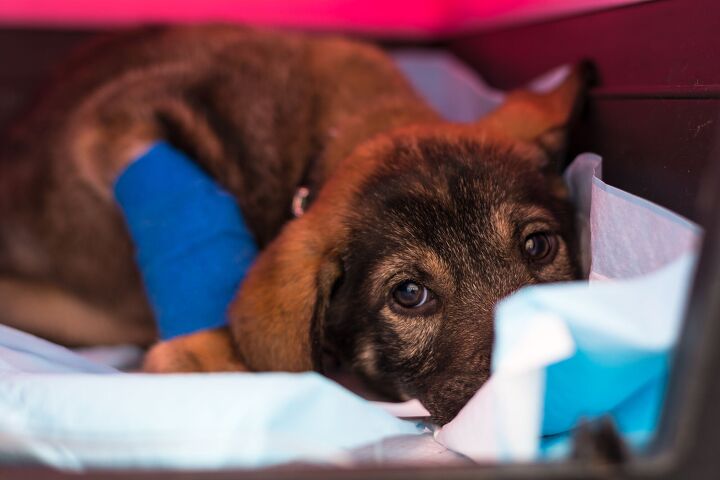First-ever Canine Parvovirus Treatment Offers Hope for Sick Puppies

Parvovirus - a single word no dog owner wants to hear. Canine parvovirus is one of the most deadly conditions that affect thousands of puppies in the U.S. yearly.
Until now, there has been no specific cure for parvovirus, with treatment relying on supportive care. But that changed in May when USDA granted a conditional license for the first-ever canine parvovirus treatment.
Developed by Elanco Animal Health Incorporated, the Canine Parvovirus Monoclonal Antibody is a single-dose intravenous injection that has been shown to reduce the length of hospital stay and increase the survival rate of dogs diagnosed with parvovirus.
In Elanco’s clinical trials, “zero dogs died when treated with Canine Parvovirus Monoclonal Antibody,” said Kristen Zersen, DVM, DACVECC, assistant professor of small animal emergency and critical care at Colorado State University Veterinary Teaching Hospital.
That’s fantastic news considering that parvo’s mortality rate is around 91% for dogs not treated with supportive care.
While the treatment efficiency study focused on eight-week-old puppies, Zersen said that safety studies have shown that the treatment is well tolerated by puppies as young as six weeks old.
“The puppies treated with Canine Parvovirus Monoclonal Antibody had significantly faster times to resolution of vomiting, inappetence, and lethargy,” said Zersen.
Elanco’s Monoclonal Antibody is the first and only treatment available for parvo which affects around 330,000 dogs each year. Administered intravenously in a single dose, this groundbreaking treatment works by binding to the virus directly, preventing it from entering into host cells.
Another great thing about this treatment is that it can be given to dogs at any stage of the disease. The effects of the treatment may vary from one dog to the next but according to Zersen, “Overall the treatment makes for less time, less worry, and less labor helping the dog to feel better faster.”
That’s a positive change considering how this deadly disease has been treated in the past. “Traditional canine parvovirus treatment can consist of 24/7 care, three to five days of hospitalization, high pet owner costs, and emotional stress with no guaranteed outcome,” explained Zersen. “Canine Parvovirus Monoclonal Antibody offers a targeted solution. Dogs are treated with one intravenous dose that’s highly effective and proven to decrease mortality and may provide faster resolution of the symptoms of this potentially deadly disease.”
Elanco expects to obtain full USDA approval in 2024, but veterinarians are able to get the medicine in the meantime.
An eight-week-old pit bull mix was one of the first to receive this lifesaving treatment and knows exactly how effective monoclonal antibodies are. As soon as Cookie started to show symptoms of parvo, including lethargy, lack of appetite, vomiting, and diarrhea, her owner brought her to the Fix Project’s Parvo ICU.
There, a test confirmed that Cookie has, indeed, contracted parvo. Cookie received Elanco’s Monoclonal Antibody treatment and was admitted to the ICU for supportive care.
“We gave the injection, placed a catheter, and gave her the rest of our protocol. And the beautiful part about the drug was we had her in and out. We parvo tested her on Friday, and she came back strong positive. By Sunday, she was eating. And then by Monday, we parvo tested her, and she was going home that day,” Dr. Andrew Cabrera, veterinarian and medical director at The Fix Project, told People in an interview.
Cookie was one of the first pups to be treated with Elanco’s Monoclonal Antibody treatment, but she wasn’t the last. Dr. Cabrera shares he has seen similar results in parvo cases he has treated.
“The success rate has been night and day,” he said. “We are able to get them eating a little faster and out of the hospital a little more quickly.”
Hopefully, vets around the country will include Elanco’s Monoclonal Antibody treatment in current parvo protocols to increase the survival rate and reduce hospitalization time.

Nevena is a freelance writer and a proud mom of Teo, a 17-year-old poodle, and Bob, a rescued grey tabby cat. Since childhood, she had a habit of picking up strays and bringing them home (luckily, her parents didn't know how to say NO). When she's not writing for her fellow pet parents, Nevena can be found watching Teo sleep. To her defense, that's not as creepy as it sounds!
More by Nevena Nacic























